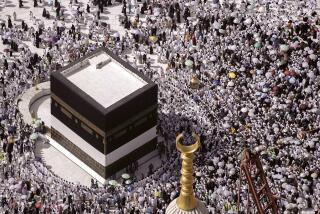Causeway Links Bahrain With Rest of World
- Share via
MANAMA, Bahrain — A causeway linking cosmopolitan Bahrain with the Arabian mainland has been a pathway to fortune for many since it opened a year ago, letting in a flood of cheap goods and free-spending tourists.
Bahraini travelers head from their island over the 15-mile King Fahd Causeway--named after the Saudi monarch--to visit relatives and friends on the mainland.
And by the thousands, they travel across the series of bridges linked by islands and reclaimed land for weekend shopping trips to buy the cheaper goods in Saudi stores.
“People over there are benefiting more than us because we buy their goods,” Bahraini businessman Yousef Alwazzan said. “They only come here for sightseeing.”
Both countries rely heavily on imports for items ranging from soap, rice and meat to clothes, cars and electronics.
“The bridge has given us new choices not possible before,” Hadi Al-Alawi, managing director of Arab Advertising said.
“If I need something for my house and can’t find it here, I just get into my car and drive to Al-Khubar or Dammam. I can take my children if I like and return on the same day,” he said.
Foreign businessmen, including bankers from the island’s offshore network, also say the link has made travel within the Persian Gulf region easier.
But the biggest bonus goes to Bahrain’s once-flagging hotel industry, which was revived with weekend carloads of visitors from Kuwait, Oman, Qatar, Saudi Arabia and the United Arab Emirates.
“The numbers are leveling off now but they’re still coming across,” said hotel manager Gerald Lawless. “We still have 90-100 percent occupancy on weekends.”
At least 4.5 million people have so far used the highway, including 1.6 million people from other states of the Gulf Cooperation Council (GCC), a regional group that links Bahrain and Saudi Arabia with four other Gulf Arab countries.
Citizens from other Persian Gulf states are attracted to Bahrain’s relatively relaxed lifestyle, where residents mix freely with visitors and alcohol is available.
Some Bahrainis say they have stopped taking their families out on weekends to spare them the unwelcome attention of causeway visitors from countries where women are rarely seen in public.
But others say the social effects work both ways.
“I think Saudi women will benefit by seeing the way we live,” said Muneera Fakhro, a Bahraini woman assistant professor of social development at the University College of Bahrain.
“We used to think of ourselves as isolated, but now we are integrated with the mainland. I have used the bridge many times and I am happy with it because when you go over you feel like you belong to a wider world.”
But for the grizzled Bahraini skippers who used to sail their traditional graceful wooden dhows regularly across the shallow Persion Gulf waters to and from the Saudi mainland, the $1.2 billion strip of tarmac has proved to be the end of the road.
Convoys of trucks rumbling across the road have displaced the dhows as a vital link in gulf trade.
“There has been no work for eight months and there is nothing I can do about it,” said dhow captain Johar Mubarek, 75.
More to Read
Sign up for Essential California
The most important California stories and recommendations in your inbox every morning.
You may occasionally receive promotional content from the Los Angeles Times.










